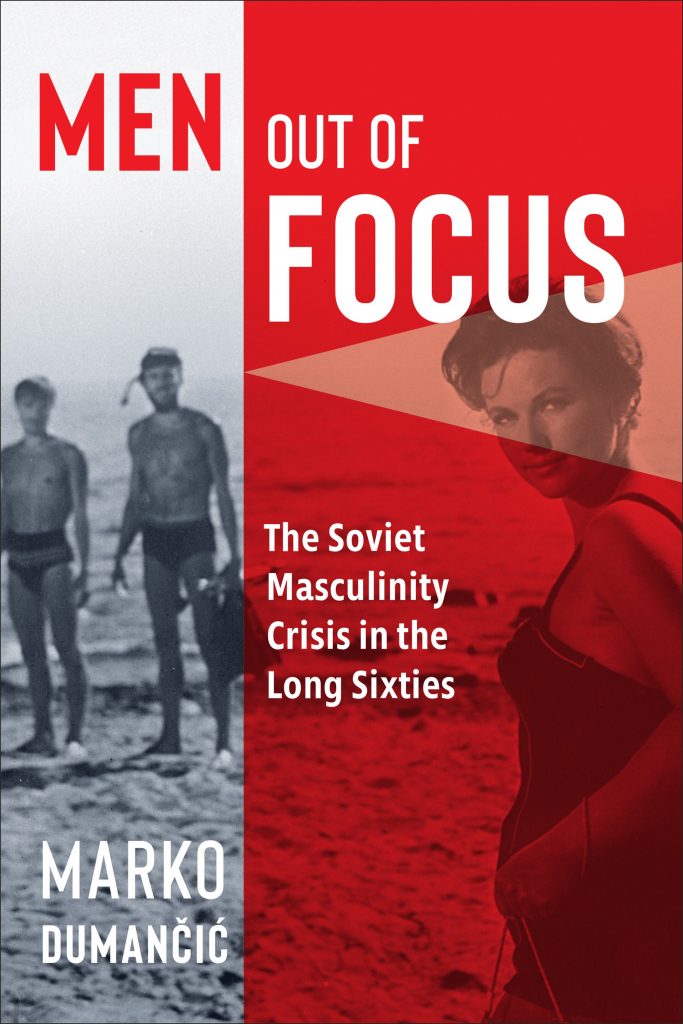It has been a while since our last book conversation here on the Russian History Blog, so the pressure was on to emerge from our pandemic cocoons with style. We can think of no better volume to do this with than Marko Dumančić’s wonderful Men Out of Focus: The Soviet Masculinity Crisis in the Long Sixties (University of Toronto Press, 2021). As someone with a deep interest both in gender history and in late Soviet culture, I was particularly eager to get my hands on this book and to talk with others about it. I’m looking forward to a vibrant conversation over the next few days. Please read on to find out more about the book and about our panelists!

Marko begins his book by citing a controversial 1968 article by Boris Urlanis entitled “Protect the Men!” Urlanis’ essay described a demographic and cultural crisis facing Soviet manhood that required both state and feminine attention to remedy. Critics (especially female critics) at the time questioned whether Soviet men really had it so bad, but Dumančić convincingly shows that the narrative of a crisis of masculinity had developed over the course of the “long sixties” (1953-1968). He is particularly interested in describing the nature of this “crisis” in Soviet film, and he patiently and expertly takes his readers on a tour of sixties film and the social realities that directors and screenwriters were responding to. In his first core chapter, Marko argues that Stalinist masculinity centered around the figure of the hero, and that de-Stalinization opened up the possibility for non-heroic portrayals of male protagonists. Several influential directors (such as Romm, Khutsiev, and Riazanov) took up this challenge in genres ranging from war movies to family dramas. Dumančić structures the book thematically, with substantive chapters analyzing fatherhood (“Being a Dad Is Not for Sissies”), family (“Fathers versus Sons, or, the Great Soviet Family in Trouble”), women (“The Trouble with Women: Consumerism and the Death of Rugged Masculinity”), cerebral masculinity (“Our Friend the Atom? Science as a Threat to Masculinity”), and a stimulating chapter that places Soviet developments alongside similarly gritty directions taken by European New Wave directors in the postwar period (“De-Heroization and the Pan-European Masculinity Crisis”). Along the way, Marko has many thoughtful insights both about cultural production and Soviet masculinity, which I’m sure our distinguished panel will tease out over the next few days.
It’s now my pleasure to introduce the panel. For those of you who don’t know me, my name is Josh Sanborn. I’m the David M. ’70 and Linda Roth Professor of History at Lafayette College in Pennsylvania, and Marko’s book intersects with my own interests in two ways. First, I’ve long worked on the history of masculinity, both in my first book (Drafting the Russian Nation: Military Conscription, Total War, and Mass Politics, 1905-1925) and in a book co-authored with Annette Timm entitled Gender, Sex, and the Shaping of Modern Europe, which is coming out in a third edition with Bloomsbury later this year. Second, I’m currently working on a book on Cold War culture(s), so Marko’s work is of great interest!

Our first post will come tomorrow from Erica L. Fraser. She is an associate professor in the Department of History at Carleton University in Ottawa, Ontario. She is a historian of postwar Soviet gender and culture interested in military institutions, daily life, and sports and leisure. Her book, Military Masculinity and Postwar Recovery in the Soviet Union, was published by the University of Toronto Press in 2019. Her next book project looks at how cultural narratives about hockey and masculinity were built and sustained in the Soviet Union.

Our next panelist will be Robert J. Corber. He is the William R. Kenan, Jr. Professor of American Institutions and Values at Trinity College and the author and editor of several books, including most recently Cold War Femme: Lesbianism, National Identity, and Hollywood Cinema.

Rounding out the panel will be Eliot Borenstein. He is Professor of Russian & Slavic Studies at New York University. His most recent books include Plots against Russia: Conspiracy and Fantasy after Socialism (2019), and Pussy Riot: Speaking Punk to Power (2020). His next books, Marvel Comics in the 1970s: The World Inside Your Head and Meanwhile, in Russia…: Russian Internet Memes and Viral Video, should be out next year.

Last, but certainly not least, is the author himself.
Marko Dumančić is Associate Professor of History at Western Kentucky University. His first book, under discussion here, Men Out of Focus: The Soviet Masculinity Crisis in the Long Sixties was published in 2021 by University of Toronto Press. His other work on Soviet, Yugoslav, and contemporary West Balkan masculinities appears in The Journal of Cold War Studies, Men and Masculinities, Cold War History, Studies in Russian and Soviet Cinema, and The Cambridge History of Communism.
His next project examines the role of masculinity in the Bosnian genocide and is supported by the National Endowement for the Humanities Summer Stipend. The study relies on court cases of war crimials convicted by the International Criminal Tribunal for the former Yugoslavia. Through a narrative analysis of court transcripts, judgments, and testimonies of those sentenced, the project will identify the defense strategies the indicted perpetrators employed to create an explanatory framework for their wartime crimes. This research will delineate how culturally dominant ideas about masculinity during wartime create a context in which “ordinary men” can transform into war criminals and become agents of genocide.

We plan to have a new post every day this week, so stay tuned, add comments, and join the conversation! We welcome comments from our blog readers. Security concerns from our hosts at the Center for History and New Media mean that all of the blog posts and comments will be routed through me as the moderator. If you make a comment, it should go to a WordPress folder that I will check regularly during our conversation. If you don’t see your comment posted within a day or so, feel free to let me know!